News
Immunisation: Experts urge concerted action to build on Lanka’s success story
View(s):Chief Epidemiologist says fair pricing of vaccines can save lives
By Kumudini Hettiarachchi
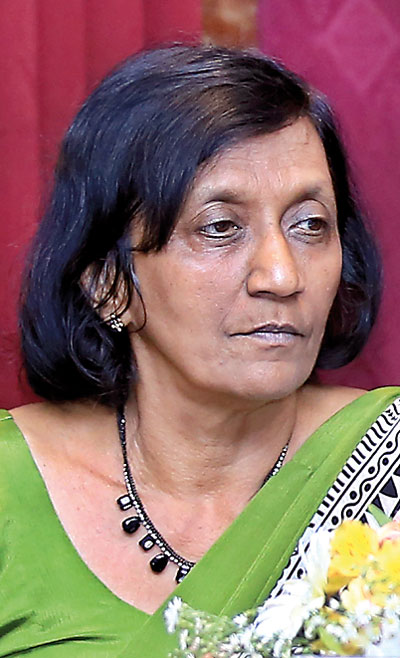
Vaccine Forum Secretary Dr. Savithri Kellapatha
Dengue, zika, pertussis (whooping cough), polio and Hepatitis C came under the spotlight, with the prevention and control of these infectious diseases which cause much misery and also death to humankind, being discussed at length.
It was vaccines which took centre-stage when the 7th Symposium on Vaccines was held on October 9 and although it was a lazy Sunday, packed was the Lionel Memorial Auditorium of the Sri Lanka Medical Association (SLMA).
Urging that everyone needs to work together, sharing information and resources to achieve high immunisation cover in keeping with the objectives of the National Immunisation Programme, Dr. Paba Palihawadana, the chief guest at these Annual Scientific Sessions of the Vaccine Forum of Sri Lanka, referred to the ‘success story’ in Sri Lanka’s public health.
Much behind-the-scenes work had gone into organising the sessions by the Vaccine Forum Council, particularly its President Dr. J.S.D.K. Weeraman, Secretary Dr. Savithri Kellapatha and Editor Dr. Prasanna R. Siriwardena.
“With both the Government and the Vaccine Forum having similar objectives including the education of public and private healthcare professionals; promoting research; educating and making the public aware; and promoting vaccination, the Vaccine Forum is seen as a supporting organisation in the government’s efforts,” said Dr. Palihawadana who is the Health Ministry’s Chief Epidemiologist.
We need to sustain age-appropriate 100% immunisation coverage, ensuring quality and also affordability, working within the National Immunisation Policy and Guidelines, she reiterated, adding that this is while educating the public which is an important aspect of immunisation, providing information to parents in an ethical manner.
With the Government supporting the private sector in such aspects as training of staff in the administration of vaccines and the maintenance of the cold-chain for the vaccines to be effective, the private sector should feel duty-bound to give feedback. It should send us feedback on the immunisation coverage of children and the adverse after-effects experienced, if any.
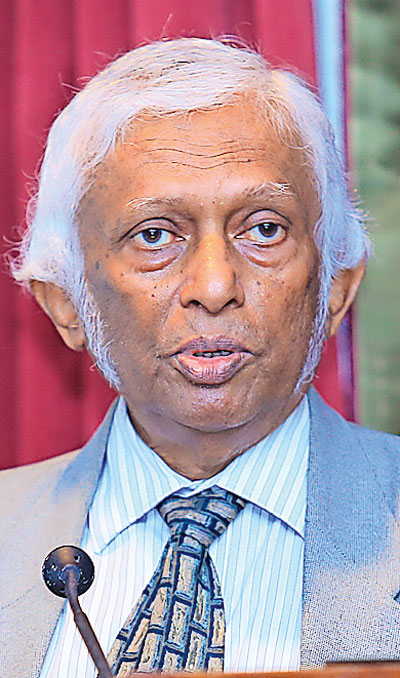
Keynote speaker Emeritus Professor Sanath Lamabadasuriya
“This is a key element and the public and private sectors need to work together to strengthen and make the immunisation programme safer. This is not just for the collection of information but invaluable when making crucial policy decisions in the future with regard to the introduction of new vaccines,” said Dr. Palihawadana.
She ended her address with “a humble request” for the fair pricing of vaccines in the private sector.
Quoting the age-old adage, “Prevention is better than cure” which still holds true, Colombo University’s Emeritus Professor of Paediatrics, Prof. Sanath Lamabadasuriya who delivered the Keynote Address on ‘Global impact of immunisation’ traced the history of immunisation, giving all the milestones.
Currently Visiting Professor of Paediatrics at the Rajarata University, he paid tribute to all health personnel at the grassroots level including midwives and public health officials for the success of the immunisation programme in the country.
He said that due to vaccination there has been no polio cases in Sri Lanka in 25 years; the only way to prevent deaths from rabies and also Japanese encephalitis which have a mortality rate of 100% is vaccination; the vaccine against Hepatitis B prevents primary hepatoma; and neonatal tetanus has been eliminated from the country by vaccinating expectant mothers. Cervical cancer in women can be prevented with the vaccine against the human papilloma virus (HPV) and in January 2017, this vaccine will be administered to 11-year-old girls under the immunisation programme.
Putting forward a strong argument for the introduction of the vaccine against pneumococcal disease, Prof. Lamabadasuriya stressed that this is the world’s largest vaccine-preventable killer of children in infancy and up to five years of age. This disease is caused by the Streptococcus pneumonia bacterium, with dire consequences — deadly pneumonia and bacterial meningitis (infection of the brain).
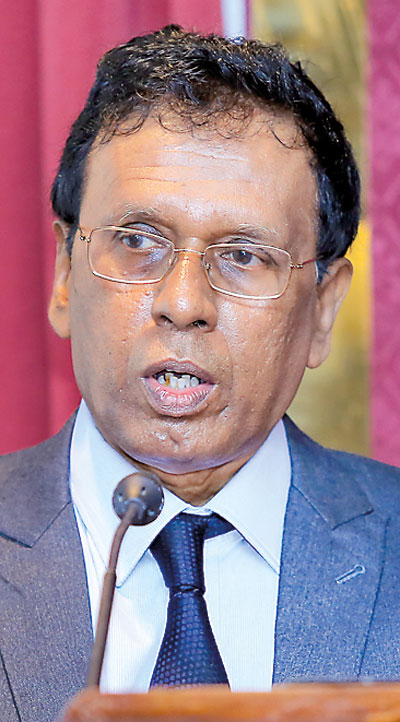
Vaccine Forum President Dr. J.S.D.K. Weeraman
Pneumococcal disease is turning out to be increasingly antibiotic-resistant and, therefore, prevention through vaccination is the only answer, this Consultant Paediatrician said, lamenting that though he has carried out a vociferous campaign for the introduction of this vaccine, it had been futile. The excuse being used was “inadequate finances”. Forthright Prof. Lamabadasuriya pointed out that Sri Lanka could, however, import bullet-proof vehicles costing millions and as such seems to have got its “priorities mixed up”.
Stating that there is a need to close the gap between the rich and the poor with regard to vaccinations, he hypothesised that the “ideal” vaccine would be a single dose containing all the vaccines, given at birth through the oral route with lifelong immunity, which does not need a cold-chain. It would be affordable to all.
“Vaccines do not prevent deaths, but vaccination does,” he added.
The other topics discussed at length during the symposium were ‘Epidemiology of Zika virus infection’ by Consultant Epidemiologist Dr. Samitha Ginige of the Health Ministry; ‘Perplexities of Pertussis’ by the Vice President, Medical Affairs, Dr. Shafi Kolhapure of GlaxoSmithKline Biologicals, India; ‘Epidemiology of Hepatitis C’ by Consultant Epidemiologist Dr. Jagath Amarasekara of the Health Ministry; ‘Clinical Presentation & Management of Hepatitis C’ by Consultant Gastroenterologist Dr. Ranjith Peiris of the National Hospital of Sri Lanka; and ‘Polio Legacy and the End Game’ by the National Professional Officer – Communicable Diseases, Dr. Janakan Nawaratnasingam of the World Health Organization Sri Lanka.
Vaccine to combat dengue: Optimism amid challenges With dengue on the minds of one and all as the rainy season begins in Sri Lanka, it was the National Coordinator of the Dengue Control Programme, Dr. Hasitha Tissera, who cast a thorough look at the first dengue vaccine and the other candidates currently in the pipeline.
Commending the industry for seeking to produce a tetravalent (for all four strains of dengue: DENV-1, DENV-2, DENV-3 and DENV-4) vaccine, he dealt with the important topic of ‘Dengue vaccine challenges’.
“Many challenges exist in the dengue vaccine development and introduction, but it is feasible,” he said, before focusing on the one-and-only vaccine currently available and the other five in different stages of development.
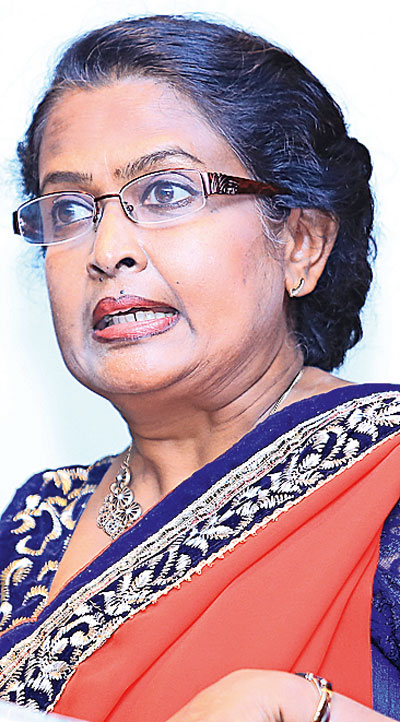
Chief guest Dr. Paba Palihawadana Pix by Anuradha Bandara
Referring to the first vaccine against dengue registered in several countries, ‘CYD TDV’, this Consultant Epidemiologist said that Sanofi Pasteur’s vaccine efficacy trials had produced mixed results. Some results were disappointing when taking the strain of DENV-2 into account and some results were promising when considering severe dengue and Dengue Haemorrhagic Fever (DHF), while some questions still remain about durability.
The vaccine candidates against dengue in the pipeline are: Takeda’s ‘TDV’ (DENVax) which is to get into Phase 3 Clinical Trials shortly; the United States (US) National Institute of Health’s ‘TV003/TV005’ which is into Phase 3 Clinical Trials; and three other candidates in Phase 1. “The dengue vaccine pipeline is robust,” says Dr. Tissera, adding, however, that there are many challenges. They include the existence of four dengue serotypes that interact with each other in important but unpredictable ways; the need to ensure efficacy and safety; the supply-demand gap; and the vaccination strategies.
Quoting dengue expert Prof. Scott B. Halstead of the International Vaccine Institute in Seoul, Korea, he said that the problem is “to show that dengue vaccines protect humans against infection or disease caused by each of the four DENV and that vaccines themselves do not directly cause symptoms in the vaccinated subject or provoke other safety problems”.
The “good news”, according to Dr. Tissera, is that the vaccine is feasible. This is because: Natural immunity exists — infection with one dengue serotype confers long-term protection against the disease with the same serotypeBasis for simultaneous tetravalent vaccination strategy — short-term protection (2 months to 2-3 years) against other serotypes and sequential natural infection by 2 serotypes may confer protection against disease by other serotypes
Meanwhile, a Policymaker Survey in Sri Lanka, sourced to the Paediatric Dengue Vaccine Initiative in 2008 has found that dengue was the most important among 15 listed infectious diseases; Sri Lanka was well poised to become an “early adopter” of dengue vaccines; and the number of “enabling factors” include a very high awareness of the disease, the country’s highly-functioning National Immunization Programme and high political commitment ensuring funding support.
Meanwhile, the guest speaker at the symposium, the Medical Director & Project Lead, Dengue Vaccine of Sanofi, Dr. Sangeeta Madhok, said that Sanofi has sought registration in Sri Lanka for its ‘CYD TDV’ vaccine against dengue.
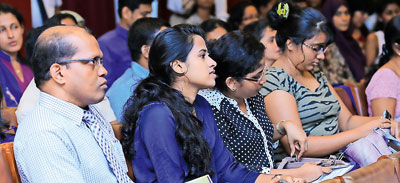
The packed audience at the Vaccine Forum sessions at the Lionel Memorial Auditoirum of the Sri Lanka Medical Association

